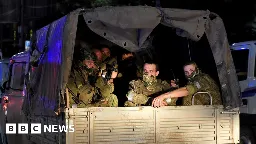[World] Ukraine war: UK criticised for 'lack of understanding' of Wagner's activities in Africa
[World] Ukraine war: UK criticised for 'lack of understanding' of Wagner's activities in Africa
A new report says that for 10 years the British government under-estimated the Russian mercenary group.

The UK government has been sharply criticised by the Parliamentary Foreign Affairs Committee (FAC) for under-estimating the dangerous growth of Russia's Wagner mercenary group.
In a scathing report, the cross-party committee of MPs accused the government of what it called "a dismal lack of understanding" of Wagner's activities in Africa.
"We are deeply concerned by the government's dismal lack of understanding of Wagner's hold beyond Europe, in particular their grip on African states," says the Committee's chair, Alicia Kearns MP.
Meaning what, exactly?
The report itemises seven states where Wagner's military activity has been detected: Ukraine, Syria, the Central African Republic (CAR), Sudan, Libya, Mozambique and Mali.
Wagner has developed a highly successful and profitable business model in these countries, enriching itself and its client rulers, mostly at the expense of the local population.
The committee, which for the first time has commissioned open-source investigative research for its 82-page report, asserts that for 10 years the British government has "under-played and under-estimated the Wagner Network's activities, as well as the security implications for Europe".
This topic has become all the more relevant this week as somewhere between 3000-10,000 Wagner mercenary fighters have set up base in Belarus while rhetorically announcing their desire to make a cross-border raid into Poland, a Nato state.
The FAC report has used evidence provided by a well-placed and senior Wagner source, a "defector", who revealed that his organisation had boasted of teaching local police authorities in the CAR how to torture civilian captives.
The Wagner Group is accused of murdering hundreds of civilians in that country while helping to prop up the regime that pays their salaries.
Mali is a prime example of a country where the Wagner Group has successfully supplanted Western, French-led forces, while ingratiating itself with an autocratic government that recently seized power.
"Where the West moves out, Wagner moves in, seeing opportunity in suffering and profit in chaos," says the report.
"The UK must provide an alternative for countries that are struggling', it adds. "It is a foreign policy goal of the Kremlin to force failing states to rely on the Wagner network."
Beyond Africa, the Wagner group was instrumental in enabling Russia's illegal occupation and annexation of Crimea in 2014.
They have since been one of Russia's most effective fighting forces in Ukraine and have recently set up base in Belarus. Today's report calls the government's approach to Wagner "remarkably complacent".
Ms Kearns told the BBC that the Wagner group was symptomatic of the wider need to regulate Private Military Companies (PMCs).
While she maintained that the atrocities allegedly committed by the Wagner Group, notably in the CAR, were in a class of their own, she acknowledged that criticism could also be levelled at Western-backed PMC's such as the US security company Blackwater that was accused of killing civilians during its time as a contractor in Iraq.
There is also a post-colonial history of western mercenary soldiers operating in Africa in the past with scant regard for human rights, notably in the Congo.
But just how much could the UK do or have done, given that the Wagner group is effectively an arm of the Russian government?
"Sanctions are not enough," says Ms Kearns. "The UK needs to proscribe the Wagner group for what it is: a terrorist organisation."